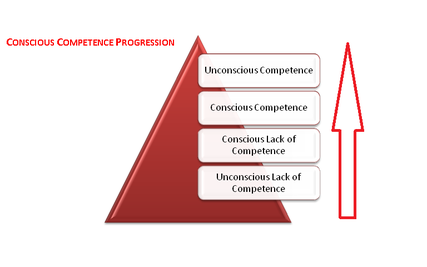I think the conscious competence ladder illustrates the process of developing your new skill really well. The conscious competence ladder is a series of 4 stages that begin with you being in a state of ignorance to you being able to use your skill on a subconscious level. Think about some of the skills you already have such as: driving a car, bike riding, skiing, reading – then think about how you got to that point.. I guarantee that at first it was really awkward and difficult, but all of a sudden it became SUBCONSCIOUS……..
1 The first stage of the process of all learning is Unconscious incompetence – I call this stage blissfully ignorant as we don't know that we don't have this skill, or even that we need to learn it. We have no awareness about the skill and no appreciation of how much we may need to learn. Often at this stage, when we discover what we DON’T know about a subject, we can get disheartened and even give up. The length of time an individual spends in this stage depends on how strongly you want to learn. So keep your eyes focused on the end result - speaking your new language; imagine that you are using your new language in a real environment and get excited about the outcome. Begin investigating ways that you can achieve your language goal.
2. Conscious Incompetence– we know that we don't have this skill. Though we don’t understand or know how to do something, we recognize what we need to learn, as well as the value of learning this new skill. This level can sometimes be demoralizing and cause you to lose confidence. It’s important to stay positive and focused on achieving your new goal. The journey of 1000 miles starts with one step – focus on putting one step in front of you – learn one new thing at a time… don’t try and learn everything simultaneously.
3. Conscious competence– we have acquired the skill and knowledge we need and are able to put our knowledge into practice. However, it still requires a lot of concentration and there is heavy conscious involvement in using your language. To move through this level requires practice and the opportunity to use your skills as often as you can. In language development – this is the time to go in country and practice your language there.
4. Unconscious competence – we don't know that we have this skill (it just seems easy).The new skill is now "second nature" and can be performed easily and SUBCONSCIOUSLY.
One of my favourite sayings is: “repetition is the mother of all learning…..” but it is really important to use repetition with intention and passion (or energy), not mindlessly, without thought…. So when you are using active learning… it generally takes 7-9 repetitions to move something from the conscious mind to the subconscious mind.
“When we practise something, we are involved in the deliberate repetition of a process with the intention of reaching a specific goal. The words deliberate and intention are key here because they define the difference between actively practising something and passively learning it.” – Thomas Sterner, The Practising Mind. Passive learning creates knowledge. Active practice creates skill.
A couple of ideas for you are:
- Take control of your learning and don’t just rely on your teachers or tutors to tell you what you need to do.
- Do homework within 24 hours of learning a new language pattern. This will consolidate it.
- Make it personal. When you are learning a new tense or language pattern, relate it to yourself and your own life. Create sentences that mean something to you…. Use vocabulary that you would usually use. Don’t just learn lists and grammar tables.
- Give everything you learn energy – be an active learner, not a passive learner. Role-play some ways that you can use your new knowledge. Visualize and become excited about using it.
- Label objects around your house. But only 7 objects at a time. Otherwise you will be overwhelmed. In your new language - Write a note on your fridge – what do you want to eat? On your door, where are you going? Allow your language to take over your life for a period of time.
- Don’t translate everything into English – Think in your new language as much as possible.
- Spend less time passively learning and more time actively practising.
Stop thinking and start doing and enjoy the process… Your language journey will open your mind to another world.


 RSS Feed
RSS Feed

